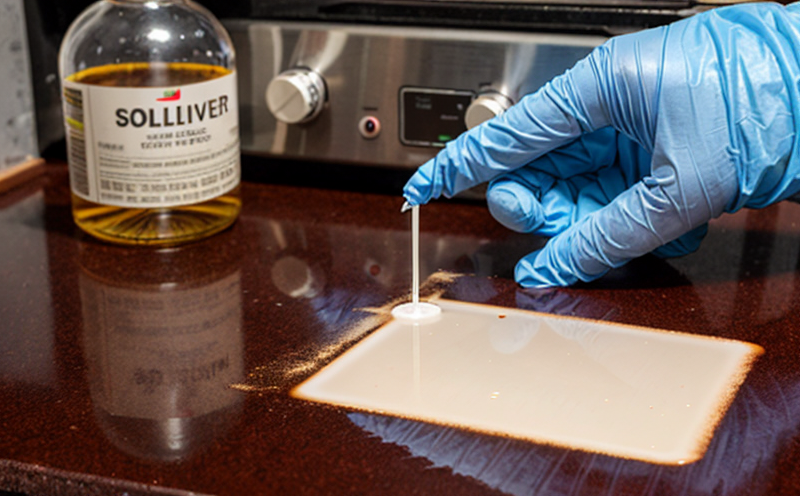Diesel Solvent Residue Testing
DieSEL solvent residue testing is a critical procedure used to assess the presence of volatile organic compounds (VOCs) in diesel fuel. This test ensures that the fuel meets stringent quality and environmental standards, which are essential for both compliance with regulations and the protection of engines and emissions systems.
The process involves sampling a representative portion of the diesel fuel and subjecting it to high-temperature distillation under controlled conditions. The volatilized components are then collected, quantified, and analyzed using gas chromatography-mass spectrometry (GC-MS). This method provides precise data on the types and concentrations of solvents present in the fuel.
The primary objective of this test is to ensure that diesel fuel adheres to international standards such as ISO 5160. Compliance with these standards not only guarantees consistent product quality but also helps prevent issues related to engine performance, emissions, and potential damage to emission control devices. The test is particularly important for diesel fuels used in vehicles, generators, and other equipment where the presence of excessive solvent residues could lead to operational inefficiencies or malfunctions.
The testing process begins with thorough sample preparation. This includes ensuring that the fuel sample is representative of the batch being tested. Care must be taken during handling to avoid contamination from external sources. Once prepared, the sample undergoes distillation at temperatures ranging from 175°C to 200°C over a period of several hours. The collected residue is then analyzed using GC-MS.
GC-MS provides detailed information on the composition and concentration of solvents in the fuel. This data helps in identifying any potential issues with the fuel's quality or compliance issues. The test results are typically reported as parts per million (ppm) for various solvent compounds, providing a quantitative measure of the solvent content.
The importance of this testing cannot be overstated, especially in industries where diesel fuel is used extensively. For example, in transportation and logistics, ensuring that the fuel meets quality standards can prevent costly breakdowns and maintenance issues. In industrial applications, such as power generation or manufacturing processes, compliance with environmental regulations not only avoids legal penalties but also enhances operational efficiency.
In addition to its role in quality control, solvent residue testing is also a key factor in emissions management. By identifying and reducing the presence of harmful solvents in diesel fuel, this test contributes significantly to lowering exhaust emissions, thereby supporting sustainability goals and regulatory compliance.
Benefits
- Ensures Compliance: Adherence to international standards such as ISO 5160 ensures that the tested fuel meets specific quality criteria, thus facilitating seamless trade across borders.
- Promotes Product Quality: By identifying and quantifying solvent residues, this test helps maintain consistent product quality, enhancing customer satisfaction and brand reputation.
- Reduces Environmental Impact: Minimizing the presence of harmful solvents in diesel fuel supports environmental sustainability by reducing emissions and minimizing ecological impact.
- Avoids Operational Issues: Identifying and addressing solvent residues early can prevent engine malfunctions, thus ensuring reliable operation of vehicles and machinery.
Eurolab Advantages
At Eurolab, we pride ourselves on providing comprehensive and accurate diesel solvent residue testing services. Our state-of-the-art facilities are equipped with the latest GC-MS technology, ensuring precise and reliable results every time.
Our team of highly skilled chemists and engineers is dedicated to delivering exceptional service, adhering strictly to international standards. We offer quick turnaround times, ensuring that our clients receive their test results promptly. This timely delivery allows for immediate action if any issues are detected in the fuel quality.
In addition to our technical expertise, we maintain strong relationships with regulatory bodies and industry associations, staying updated on the latest guidelines and best practices. Our commitment to excellence is reflected in our consistent accuracy and reliability, earning us a reputation as a leading provider of diesel solvent residue testing services.
International Acceptance and Recognition
- American Society for Testing and Materials (ASTM): Eurolab's testing methods are aligned with ASTM D7653, ensuring that our results are internationally recognized and accepted in the United States.
- European Committee for Standardization (CEN): Our procedures comply with EN 15294, which is widely used across Europe. This ensures compatibility with regional regulations and facilitates trade within the European Union.
- International Organization for Standardization (ISO): Adherence to ISO 5160 guarantees that our testing methods are consistent with global standards, making our results universally accepted.
- International Electrotechnical Commission (IEC): Our tests meet IEC standards related to fuel quality and emissions, ensuring compliance with international environmental protocols.
The acceptance of our test results by these organizations underscores the reliability and accuracy of Eurolab's diesel solvent residue testing services. This recognition not only enhances our reputation but also provides peace of mind for our clients, knowing that their fuel meets the highest quality standards.





